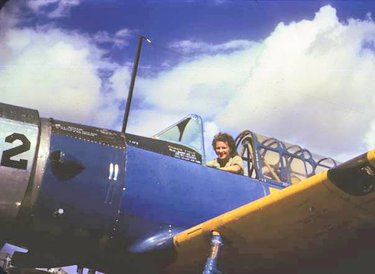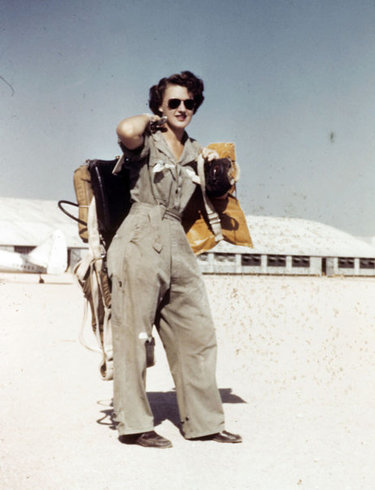Lunch at the Waldorf
The Enterprise — Melissa Hale-Spencer
Wearing her wings in a charm on her necklace, Lillian Lorraine Yonally reminisces over her experiences as a pilot during World War II. She was born on May 5, 1922 and grew up on the ocean in Bedford, Mass. where she enjoyed the freedom of sailing before she discovered the freedom of flying.
The Enterprise — Melissa Hale-Spencer
Friends by chance: Judy Slack, of Altamont, left, invited Lillian Lorraine Yonally, of Colonie, to the Home Front Café after they sat together on a recent commercial flight. Yonally felt at home among the World War II memorabilia of the café and Slack said she is learning a lot from Yonally.
The Enterprise — Melissa Hale-Spencer
Intimate exchange: Lillian Lorraine Yonally, right, a pilot during World War II, listens as Cindy Pollard, owner of the Home Front Café in Altamont, leans in to talk to her during a visit last Thursday. Yonally was a WASP, a member of the Women Airforce Service Pilots (WASP) whose surviving members, including Yonally, were given the Congressional Gold Medal in 2010.
ALTAMONT — While many passengers sit silently on airplane flights — each locked in a solipsistic world of a video game or mystery novel or laptop spreadsheet or sleep — Judy Slack reaches out: She talks to the person in the seat next to her.
On a recent vacation flight, that person was a celebrity of sorts, a woman who understands the challenges and marvels of flying. Lillian Lorraine Yonally was a pilot in civil service for the United States during World War II.
Her memories are crisp and vivid. She shares them willingly, some of them raucously, with only occasional prompts to get past her modesty.
Slack, a longtime Altamont resident, invited Yonally to lunch last Thursday in the restaurant that serves as the village’s living room — the Home Front Café. Cindy Pollard, who owns the eatery with her husband, set out to re-create the atmosphere of her mother’s 1940s kitchen. She has filled the place with World War II memorabilia and honors veterans of all eras, and even has had them share their stories with schoolchildren.
Yonally, who turned 92 on May 5, looked at home seated at a table with a flowered cloth across from Slack. A diminutive woman, she has a ready smile.
She looked at a large painting by Helderberg artist John Williams on the wall across from her of a fighter plane, a Bell P-69 Airacobra, being serviced by mechanics, and said she wished she could have flown one of those. “I didn’t fly anything exciting,” Yonally said with a shrug.
Hearing her comment, the artist responded, “It’s probably a good thing she didn’t fly one of those.” Williams said, “It wasn’t a very good plane. We sold most of them to China and Russia.”
He said he was inspired to paint the scene when he saw it in the background of a larger picture in a flight magazine. “It was about the size of two postage stamps,” said Williams. But it struck him that the mechanics’ work was essential for the safety of the pilot while, in turn, the pilot put his life on the line to protect the mechanics and their families.
“It’s about everybody being dependent on everybody else,” Williams said of the painting.
Yonally ordered “Lunch at the Waldorf,” featuring the apple-laced salad made famous by the New York City hotel.
Yonally recalled attending a formal affair at the Waldorf Astoria in 1941, when she graduated from Katharine Gibbs. She spells “Katharine” to be sure the second “a” is understood in the name of the prestigious school for secretaries — one of the few avenues women had to pursue careers in that era.
Her aunt and uncle made sure she had fine clothes to wear to the affair at the Waldorf, she said. They were also the ones who interested her in taking flying lessons.
Yonally grew up on the sea in New Bedford, Mass.; she still pronounces the name with a New England accent, where the “r” in Bedford is silent. She likes to sail and swim and fish; as a girl, she got an allowance for putting out life preservers.
But her seaside life was not idyllic. Her parents divorced when she was 3. Her mother took her younger sister, Dorothy, and returned to Canada, where her grandfather was in the fishing business.
Yonally was raised by her father, who worked in his family’s coffee business.
“Daddy remarried when I was 14. It was logical I attend boarding school,” Yonally said matter-of-factly. She went to the Lincoln School in Providence, Rhode Island.
When she expressed interest in her aunt and uncle’s flights, Yonally recalled, “Daddy said, ‘Would you like to try?’ I said, ‘Sure.’ He’d rather have me fly than bang up my stepmother’s car, which I had done.”
She got her license at Roosevelt Field, where Charles Lindbergh had taken off for his famous solo trans-Atlantic flight in 1927. Yonally got her private pilot license on Sept. 7, 1941, three months before the Japanese attack on Pearl Harbor would bring America into the war.
Right after graduating from Katharine Gibbs, Yonally was working at a secretarial job for an engineering firm in New York, which she didn’t much like. On the subway rides to and from work, she’d study her flying manual.
She fulfilled her requisite six months at the engineering firm and asked for a job working for an air company. Yonally landed a job at Grumman, which had built a new hangar for the F-6s.
“I got the job of working in the control tower,” said Yonally, with excitement in her voice all these decades later. She liked her work as an air traffic control operator but it didn’t last long.
After she turned 21, she got a telegram that she could report to Avenger Field in Sweetwater, Texas to join other female pilots to help with the war effort. The women pilots, trained like the men, would free the men for combat by, among other duties, ferrying aircraft from factories to military bases, testing planes for safety, and towing aerial targets.
Yonally had to borrow money to get to Texas. She did not hesitate. She recalls telling her boss at Grumman, “I’m quitting and I need to borrow $300.” Grumman obliged.
“I left everything,” she said.
Yonally explained the role of two pioneering female pilots in setting up the program: Nancy Love had recognized, if the United States went to war, there would be a shortage of male pilots. She and Jacqueline Cochran checked and found out thousands of women had private licenses. Each were training female pilots when the Women Airforce Service Pilots (WASP) program was set up in 1943.
Over 25,000 applied to join the WASP, with 1,074 being admitted and passing the rigorous training.
“The girls flew with the guys and there was no hanky-panky,” said Yonally. “We behaved.”
The female pilots prepared for testing on flying different types of military planes.
“I’ve never since been as scared as I was to take that exam,” said Yonally. “You had to do a spin or a double spin and come out at the same heading. They didn’t like women flying.”
After she graduated, she could fly day or night in B-13s and B-15s.
She said of night flying, “The first time I fired up that engine, the flames flew…I was a little shook.” But, she went on, “It’s really easier to fly at night; there are lights so you can tell where you are.”
“After Sweetwater, 20 of us were sent to Mather Field in Sacramento….We got B-25 training to see if we could compete with the guys…Nineteen of us got through.”
Yonally shook her head as she talked about the woman who didn’t complete the training: “I can’t imagine any girl quitting for a guy instead of flying a B-25. She did.”
The only other time Yonally shook her head was in disappointment over a promise she said was made but not kept. “We were civil service. We were promised militarization but did not receive it.”
Despite the fact that 38 members of the WASP were killed in service, they were not considered part of the military and did not get the benefits given men. Many had to even pay their own way home when the unit was disbanded in 1944. The program was stopped as male civilian pilots lobbied for their jobs. It wasn’t until 1977 that the female pilots were granted veteran status.
In 2010, Yonally was among the 200 or so WASP veterans who accepted the Congressional Gold Medal — the highest civilian honor given by Congress — in a ceremony at the Capitol in Washington, D.C.
With her training complete in1944, Yonally was one of nine pilots assigned to March Field near Riverside, Calif. One of her duties was to fly over mountains and land in the Mojave Desert.
A sleeve was attached to her plane, which made it difficult to maneuver. “I had a tow-reel operator,” she said, explaining the process for letting men on the ground practice shooting. “He’d let the sleeve out…I’d go back and fourth in front of the firing line. They shot live ammunition at my sleeve.”
The bullets were colored so that it could be determined who had hit the sleeve. “They’d check the sleeve for colored holes,” she said.
Did she worry about getting hit by a stray practice shot?
“Not until the day they cut my tow reel with a wild bullet,” she said with a smile.
That day, Yonally decided to go down to see what the guns looked like. “They looked a lot bigger than I thought,” she said.
The man in charge of the firing line was James Marvin Yonally. “I met him at the firing line. He called me at the barracks and asked for a date,” she recalled.
Although she said there was not a lot to do on a date in the desert, it must have gone well enough; he became her husband. Together, they raised six children, three sons and three daughters.
“Once, I did take him up for a flight,” she said of her husband. “He was not impressed. He thought women had a place.”
One of the things Yonally has valued the most during the war years and in the decades since is the camaraderie she shared with the other pilots. The women have gotten together for regular reunions and Yonally counted several of them her closest friends.
She has outlived many of them and her husband, too.
“We all offered our lives to each other as co-pilot or pilot,” she said, explaining the closeness. “So you trust each other.”
Why did they fly?
Yonally flings her right arm skyward in a forceful gesture and practically shouts, “It’s freedom. It’s a wonderful feeling.”




